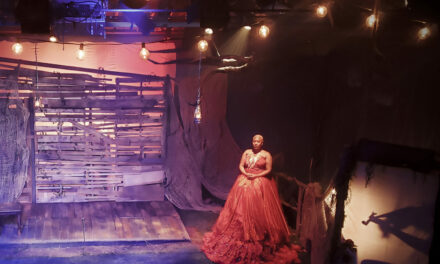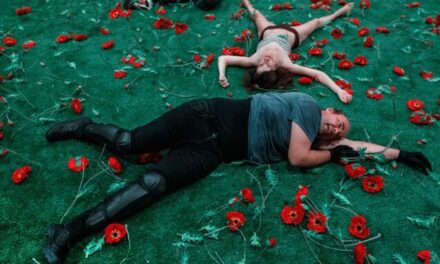Caryl Churchill’s new 10-minute play, Pigs and Dogs, just opened at the Royal Court Theatre, under the direction of Dominic Cooke, the Court’s former Artistic Director and Churchill’s regular collaborator; it stars Fisayo Akinade, Sharon D Clarke, and Alex Hassell. This is the second play of Churchill’s to be staged at the Royal Court during its 60th anniversary season. Like her Seven Jewish Children, Pigs and Dogs uses the current political setting as a backdrop, painting a story of power, political ambition, and religious fanaticism.
This time, Churchill tackles Uganda, where, in 2014, President Yoweri Museveni signed into law an anti-homosexuality act. Although homosexual relationships had been illegal in Uganda since British Colonial rule, the new law increased the penalty from 14 years to life imprisonment. The original proposal called for the death penalty, but it was mitigated following threats from the West that it would withhold aid if the proposed death penalty passed. Similar laws passed in Namibia, Kenya, and Somalia. The title of the play refers to the statement on homosexuality made by President Robert Mugabe of Zimbabwe: “If dogs and pigs don’t do it, why must human beings?” In response to an anti-gay climate and legislation, many African gay men and women have begun speaking out to the press.
Pigs and Dogs is based on the book Boy Wives and Female Husbands, by the sociologist Stephen O. Murray and the anthropologist Will Roscoe. It chronicles the history of homosexuality in Africa, illuminating the contemporary debates as well as myths and ancient folkloric storylines. Considered a product of Western colonialism, homosexuality remains taboo in much of Africa, making the contemporary debates complex and embedded within multilayered socio-economic, cultural and religious frameworks.
Churchill’s short play is minimalistic; it features a bare stage and just one, albeit very specific, stage direction: “Three actors, any gender or race but not all the same. Each can play any character regardless of the character’s race or gender.” Jane Shilling of The Telegraph describes the play as poetic and dance-like:
The incantatory effect is heightened by the repeated phrase, “Somebody says,” as each new character is introduced, until the empty stage seems populated with an invisible host of missionaries, old colonialists, politicians, rappers, tyrants and lovers. From the pixelated accretion of contradictory assertion, an image slowly emerges: of a continent repeatedly bent to the will of colonial prejudices, until its leaders eventually found it expedient to internalise those prejudices into a narrative of defiance against the decadent imperialist culture.
In writing the play, Churchill stepped into a complicated historical and geopolitical situation; not one to shy away from challenging subjects, however, she might perhaps be one of the few Western playwrights who could tackle this issue.
This post was written by the author in their personal capacity.The opinions expressed in this article are the author’s own and do not reflect the view of The Theatre Times, their staff or collaborators.
This post was written by The Theatre Times.
The views expressed here belong to the author and do not necessarily reflect our views and opinions.

















